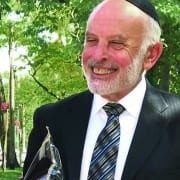D’vrei HaShomrim by Rabbi Sandy Dresin, Chaplain (COL) USA, Ret
This article is being written during the month of Elul, the month that precedes Rosh Hashanah. Each morning in Elul, at the conclusion of the weekday service, the Shofar is sounded. It is the view of the Rambam, the great rabbinic sage, that the blast of the Shofar serves us as a wake-up call, reminding us that Rosh Hashanah, also known in the Torah as the Day of Judgement, is just around the corner. This is a time that reaches out to us, calling for self-scrutiny and introspection in preparation for what is coming. Just as a marathoner does not run an event without warming up and stretching, Elul is the time given to us for a spiritual warm-up.
Those of us who have served in the armed forces are well acquainted with the difficulties and challenges that came with that service. A key for dealing with both routine and extraordinary crises is the quality of our resilience and our ability to cope and rebound. Those who take their religious faith seriously are endowed with “Spiritual Resilience.” As a Vietnam veteran, my Jewish faith helped me cope and overcome the often traumatic episodes I encountered in combat as well as in daily life.
The process of developing spiritual resilience goes hand in hand with introspection and self-scrutiny. The military provides us with a model in the form of tactics in the short-term and strategy for the long-term. The process consists of asking ourselves a few challenging questions such as: where am I now on life’s continuum, where do I want to be, and how do I plan to get there. This process must be undertaken in small and thoughtful bites. If my ultimate goal is too ambitious, it will only lead to frustration; if not ambitious enough, it will lead to complacency. This undertaking fits into another theme of the month of Elul, that of Teshuva or repentance. Teshuva is a four step process: identifying inappropriate behavior, regretting it, abandoning it, and then requesting forgiveness from The Almighty.
Elul is the month that comes with the opportunity to seek out and identify the special and unique role for which we were created. As the Talmud Sanhedrin teaches, every person must recognize that ‘the world was created for me, not to exploit it – but rather to provide the opportunity to make a contribution to the betterment of society and the human condition. Should we fail, the world will be bereft of that unique offering only we are capable of contributing.
May you and all those you hold dear be inscribed for the coming year in The Book of Life for a happy, healthy, prosperous, and meaningful New Year.
Volume 73. Number 3. 2019




